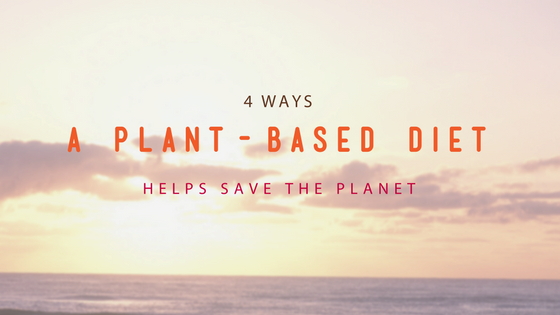
Did you know what we put on our plates has a major impact on our planet's health?
Yep, it's true. The kinds of foods we grow, produce, and eat have the biggest environmental impact of any human activity. So, in honor of Earth Day, what can we add to our plates to help our planet thrive?
Plant-based foods!
Hey, don't just take our word for it. Let's have a look at the science...
1. Reduces Carbon Footprint
Did you know that the meat industry is responsible for approximately 20 percent of the world’s greenhouse gas emissions? That's more than the combined exhaust from all transportation. Crazy, right? The average American's annual beef consumption creates as much greenhouse gas as driving a car over 1,800 miles!
How eating plants could help: Producing one calorie of meat requires nearly twenty times the amount of energy as one plant calorie! Switching to a plant-based diet saves 50 percent more carbon emissions than driving a Prius.
2. Conserves Water
The United States uses a lot of water - 355,000 million gallons per day! And more than half of our water usage goes towards animal agriculture. The recent California drought is a great example of excessive water usage. Experts found a surprising culprit: alfalfa. And if you're thinking "Wait, wait! that's a plant!" You're right...except this plant, which is grown on over a million acres in California and uses more water than any other crop in the state, is grown specifically for "grass-fed" cattle.
How eating plants could help: Predictions show if we ate plant foods half the time we could reduce our individual food-related water footprint by 30 percent. If we ate a totally plant-based diet, that water footprint goes down by almost 60 percent!
3. Cuts down on water pollution
Livestock creates 500 million tons of manure a year! As runoff from this manure often makes its way to streams, lakes, and the ocean, it also has the potential to pass on over 40 diseases to humans! Even more, this animal waste is loaded with excess nitrogen and phosphorous. These two pollutants have been identified as the main threat to US Coastal Waters because they're responsible for the algal blooms that deplete oxygen in the water and ultimately kill marine life.
How eating plants could help: Plants don't poop (obvious one, but had to be said...) and if we eat organically grown plants, we can reduce fertilizer runoff.
4. Reduces deforestation
Our planet is currently losing over 15 billion trees each year...that's 56 acres of forest every minute. And food is the number one reason for deforestation. More specifically, animal-based foods. Nearly 80% of land deforested in the Amazon is now used as a cattle pasture.
How eating plants could help: If everyone were plant-based in 2050, we would need less cropland that we did in 2000. This means we could "reforest" an area about the size of the whole Amazon forest.
Celebrate Earth Day with MamaSezz

Whether you're already eating plant-based or a need a little help getting started, we're here to make it easier.
Our ready-made and plant-based meals are made with 100% organic ingredients, sourced from local farms here in New Hampshire and Vermont, and each delivery arrives in eco-friendly and reusable coolers to reduce waste.
Here's to making a positive change this Earth Day!
By Ali Brown
Ali is a nutrition and lifestyle writer and editor, with a Plant-Based Nutrition Certificate from the T. Colin Campbell Center for Nutrition Studies.
